
Simone Signoret was a French actress. She received various accolades, including an Academy Award, three BAFTA Awards, a César Award, a Primetime Emmy Award, and the Cannes Film Festival Award for Best Actress, in addition to nominations for two Golden Globe Awards.

Terms of Endearment is a 1983 American family comedy-drama film directed, written, and produced by James L. Brooks, adapted from Larry McMurtry's 1975 novel of the same name. It stars Debra Winger, Shirley MacLaine, Jack Nicholson, Danny DeVito, Jeff Daniels, and John Lithgow. The film covers 30 years of the relationship between Aurora Greenway (MacLaine) and her daughter Emma (Winger).

Shirley MacLaine is an American actress and author. Known for her portrayals of quirky, strong-willed and eccentric women, she has received numerous accolades over her eight-decade career, including an Academy Award, an Emmy Award, two BAFTA Awards, six Golden Globe Awards, two Volpi Cups and two Silver Bears. She has been honored with the Film Society of Lincoln Center Tribute in 1995, the Cecil B. DeMille Award in 1998, the AFI Life Achievement Award in 2012, and the Kennedy Center Honor in 2013.

Alice Doesn't Live Here Anymore is a 1974 American romantic comedy drama film directed by Martin Scorsese and written by Robert Getchell. It stars Ellen Burstyn as a widow who travels with her preteen son across the Southwestern United States in search of a better life. Kris Kristofferson, Billy "Green" Bush, Diane Ladd, Valerie Curtin, Lelia Goldoni, Vic Tayback, Jodie Foster, Alfred Lutter and Harvey Keitel appear in supporting roles.

The Evening Star is a 1996 American comedy-drama film. It is a sequel to the Academy Award-winning 1983 film Terms of Endearment starring Shirley MacLaine, who reprises the role of Aurora Greenway, for which she won an Oscar in the original film. Based on the 1992 novel by Larry McMurtry, the screenplay is by Robert Harling, who also served as director.

Two Mules for Sister Sara is a 1970 American-Mexican Western film in Panavision directed by Don Siegel and starring Shirley MacLaine set during the French intervention in Mexico (1861–1867). The film was to have been the first in a five-year exclusive association between Universal Pictures and Sanen Productions of Mexico. It was the second of five collaborations between Siegel and Eastwood, following Coogan's Bluff (1968). The collaboration continued with The Beguiled and Dirty Harry and finally Escape from Alcatraz (1979).

Ernest Thompson is an American writer, actor, and director. He won an Academy Award for Best Adapted Screenplay for On Golden Pond, an adaptation of his own play of the same name.
The 37th New York Film Critics Circle Awards honored the best filmmaking of 1971. The winners were announced on 29 December 1971 and the awards were given on 23 January 1972.

The Possession of Joel Delaney is a 1972 horror film directed by Waris Hussein and starring Shirley MacLaine and Perry King. It is based on the 1970 novel of the same title by Ramona Stewart. The plot follows a wealthy New York City divorcee whose brother becomes possessed by a deceased serial killer who committed a series of gruesome murders in Spanish Harlem.
Frank Daniel Gilroy was an American playwright, screenwriter, and film producer and director. He received the Tony Award for Best Play and the Pulitzer Prize for Drama for his play The Subject Was Roses in 1965.

Sweet Charity is a 1969 American musical comedy-drama film directed and choreographed by Bob Fosse in his feature directorial debut, written by Peter Stone, and featuring music by Cy Coleman and Dorothy Fields.
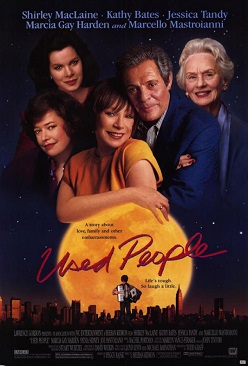
Used People is a 1992 romantic comedy film directed by Beeban Kidron. The film stars Shirley MacLaine, Marcello Mastroianni, Bob Dishy, Kathy Bates, Marcia Gay Harden, Jessica Tandy, Doris Roberts and Joe Pantoliano. The screenplay by Todd Graff, adapted from his 1988 off-Broadway play The Grandma Plays, takes a humorous look at a highly dysfunctional family living in the New York City borough of Queens circa 1969. It is an international co-production between Japan and the United States.
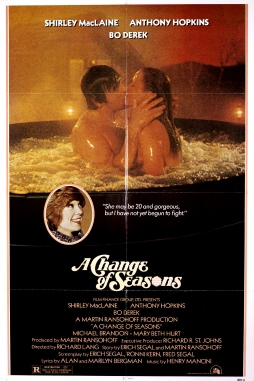
A Change of Seasons is a 1980 American comedy-drama film directed by Richard Lang. It stars Anthony Hopkins, Shirley MacLaine and Bo Derek. The film was a critical and commercial failure, grossing $7.2 million against its $6 million budget and receiving three nominations at the 1st Golden Raspberry Awards including Worst Actor (Hopkins) and Worst Screenplay.
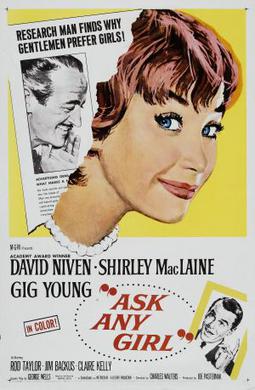
Ask Any Girl is a 1959 American romantic comedy film directed by Charles Walters and starring David Niven, Shirley MacLaine, and Gig Young. It was produced by Metro-Goldwyn-Mayer and based on a novel by Winifred Wolfe.
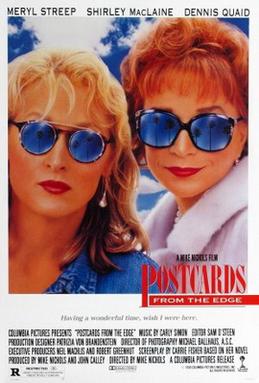
Postcards from the Edge is a 1990 American comedy-drama film directed by Mike Nichols. The screenplay by Carrie Fisher is based on her 1987 semi-autobiographical novel of the same title. The film stars Meryl Streep, Shirley MacLaine, and Dennis Quaid.

The 9th annual Berlin International Film Festival was held from 26 June – 7 July 1959. The festival welcomed the cinematic movement known as the New Wave and screened the work of directors such as Jean-Luc Godard, Agnès Varda and François Truffaut. The Golden Bear was awarded to the French film Les Cousins directed by Claude Chabrol.
The 21st annual Berlin International Film Festival was held from 26 June – 6 July 1971. The Young Filmmakers Forum section was introduced at the festival. The Golden Bear was awarded to the Italian film Il giardino dei Finzi-Contini directed by Vittorio De Sica.

Desperate Characters is a 1970 novel by Paula Fox.
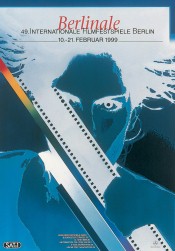
The 49th annual Berlin International Film Festival was held from 10 to 21 February 1999. The festival opened with Aimée & Jaguar by Max Färberböck. The Golden Bear was awarded to Canadian-American film The Thin Red Line directed by Terrence Malick.
















